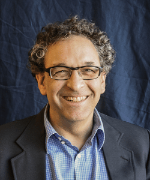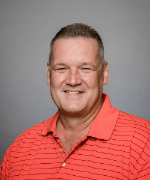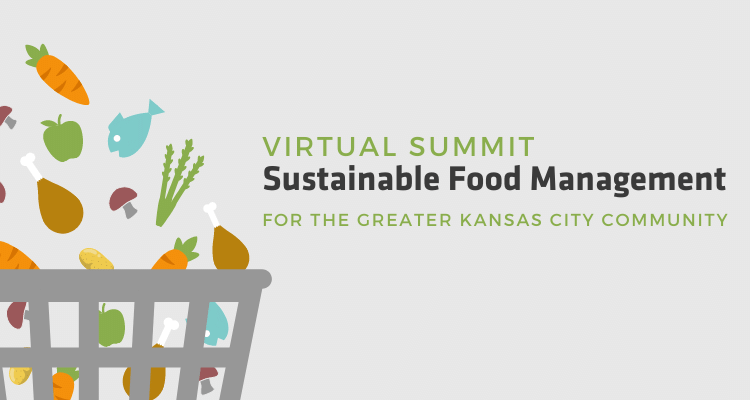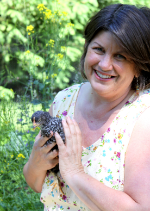Sustainable Food Management
for the greater Kansas City community
Presentations
April 13 | Main Session/Introduction Slides | Breakout Session Summary
April 20 | Main Session/Introduction Slides | Breakout Session Summary
Keynote Presentations

"Here We Grow: Food Waste and Climate Resilience in the Kansas City Region"
Tom Jacobs | Director of Environmental Programs, Mid-America Regional Council (MARC)

"Product Sourcing to Minimize Waste" Brian Fry | Director of Acquisitions, Harvesters Community Food Network
View Presentation
Panel Discussion
|
Terrell Dyer |
Max Kaniger |
Teresa Kelly |
"What’s Next for the Kansas City Food System?" Featuring Terrell Dyer, Founder, Project RALLY; Max Kaniger, Founder, Kanbe’s Markets; Teresa Kelly, Supply Chain Specialist, KC Food Hub
View Discussion
Local Resources
Kanbe's Markets is a nonprofit organization providing access to fresh, affordable and healthy foods to people experiencing food insecurity through Healthy Corner Stores. By providing innovative food delivery systems that are more inclusive, enhance small businesses and empower individuals to make healthy choices, we step closer toward an equitable future of food.
The KC Food Hub is a farmer-owned and farmer-run cooperative of family and non-profit farms that aggregate produce, protein, and value-added goods to meet the demands of Kansas City’s middle market including schools, corporate cafeterias, restaurants, and grocery stores. Our farmers grow on 400 acres, have 325 years of collective experience, and operate forty high tunnels and greenhouses for all-season production.
The KC Food Hub improves the economic viability of sustainable local agriculture by coordinating year-round production, supporting emerging growers, and by bringing farmers and buyers together. The KC Food Hub creates a more food secure metro by connecting its residents with food produced locally.
K-State Research and Extension Rapid Response Center - https://www.rrc.k-state.edu
- Reducing Food Waste
- Food Preservation
Home food preservation is a way to preserve the freshness of homegrown food. Learn proper food preservation techniques, including tips for canning, making jams and jellies, pickling and dehydrating. - Local Food Resources for Kansans
University of Missouri Extension is committed to using the latest research-based guidelines to give consumers the tools they need to safely succeed when preserving food at home. They provide hands-on workshops, fact sheets and answers to questions on canning, freezing, dehydrating and storing food products for long term storage. Learn more
The mission of the Johnson County Food Policy Council is to improve the health and well-being of individuals, the community and our environment through a just, equitable and sustainable food system in Johnson County. Through policy recommendations, education and collaborations, we strive to increase access to healthful food that is locally produced when available. Learn more
The purpose of the Greater KC Food Policy Coalition is to Strengthen our regional food system to provide healthy, affordable food for everyone in Greater Kansas City. The Coalition includes grass-tops leaders from all critical segments of our regional food system. Learn more
In 2017, we drove the design and adoption of the comprehensive Douglas County Food System Plan to guide the creation of a local food system that promotes health, economic vitality, sustainability, and equity. The plan itself is founded on principles of inclusion, drawing from the experiences and perspectives of residents from diverse cultural, ethnic, and socioeconomic backgrounds through nearly a year of public engagement, which deliberately sought the voices of traditionally underrepresented and unreached members of the community. Learn more
MARC is a nonprofit association of city and county governments and the metropolitan planning organization for the bistate Kansas City region. Governed by a Board of Directors made up of local elected officials, we serve nine counties and 119 cities. We provide a forum for the region to work together to advance social, economic and environmental progress. MARC’s environmental programs include the Solid Waste Management District and the Climate Action Plan, which includes a section dedicated to food waste. Learn more
After the Harvest (ATH) rescues nutritious fruits and vegetables from going to waste and donates them to agencies that serve hungry people, primarily in Greater Kansas City. Our volunteers glean after the harvest, picking what’s left in farmers’ fields and picking up already harvested leftover produce. The majority of the funds we raise helps secure semi-truckloads of donated produce that might otherwise end up in landfills. Learn more
Harvesters is a nonprofit, regional food bank serving a 26-county area of northwestern Missouri and northeastern Kansas. Harvesters provides food and related household products to more than 760 nonprofit agencies including emergency food pantries, community kitchens, homeless shelters, children’s homes and others. They also offer education programs to increase community awareness of hunger and teach about good nutrition.
Harvesters is a certified member of Feeding America, a nationwide network of more than 200 food banks. Harvesters also is a regional disaster-relief staging site for Feeding America. We are prepared to distribute food, water and cleaning supplies to disaster sites on short notice. Harvesters’ mission is to feed hungry people today and work to end hunger tomorrow. Learn more
Bridging The Gap (BTG) works to make the Kansas City region sustainable by “connecting environment, economy and community,” and is the premier organization in the area providing environmental education and volunteer action through more than 1,500 volunteers annually. BTG has a long history of being a major force in educating Kansas Citians about the environment and establishing recycling and other sound behaviors in the region. However, the greatest testimony of success are the thousands of trees planted, the millions of pounds of emissions averted, the protection of native ecosystems, litter-free neighborhoods, and the competitiveness of community businesses through energy efficiency and reduced waste.
Additionally, Bridging the Gap hosts the Green Business Network, which educates, connects and inspires hundred of metro area businesses to implement sustainable initiatives in the workplace.
KCCG is a non-profit membership organization that helps people grow vegetables and fruit from garden plots and orchards located in backyards, schoolyards, vacant lots and community sites. KCCG offers low-cost seed and plant varieties chosen to thrive in the Kansas City climate along with garden resources, free educational workshops and technical assistance… all to help your garden and orchard thrive! KCCG Programs assist gardens and orchards across the Kansas City Metro area; whether you are an individual gardener or part of a school or an organization, KCCG can help you grow your own nutritious food! Learn more
For over a decade, New Roots for Refugees has empowered families from the refugee community to start farm businesses by growing and selling produce through farmer’s markets, wholesale, and the New Roots Farm Share. At the Juniper Gardens Training Farm, farmers are given a quarter-acre plot to grow vegetables such as tomatoes, beets, spinach, green onions, lettuce, eggplants, and more. Farmers bring agricultural expertise from their home country and continue to learn more about growing sustainably in the Midwestern climate.
Food Equality Initiative (FEI) is the nation’s leading organization working to increase access to allergy friendly and gluten free foods to individuals who need them the most. the organization has been at the forefront of a movement calling attention to the challenges of living with food allergies and celiac disease. Presenting at national conferences and advocating for the inclusion of more allergy friendly and gluten free foods in the Special Supplemental Nutrition Program for Women Infants and Children’s (WIC) Food Package have all been central in an effort to increase access in all communities.
At Just Food, they are a reflection of the community they serve. Through connection with businesses, organizations, schools, volunteers, local government and individuals they are able to identify gaps within our food system and solve problems strategically. It is because of these partnerships that they are able to bridge the gap from being food insecure to ensuring that folks in our community are fed healthy foods without barriers. Learn more
Missouri Organics began accepting food waste in 2004 through their award-winning FRED program (Food Residuals Environmental Division), with the support of the Missouri Department of Natural Resources and Mid-America Regional Council Solid Waste District. Every year they divert more than 32 million pounds of food waste from area landfills.
KC Can Compost is an innovative enterprise committed to the transformation of Kansas City’s social and environmental landscapes. They not only collect organic waste and divert it from the landfill for composting but also educate and train men and women struggling to overcome barriers to employment for work in green industry jobs.
KC Can Compost’s Green Core Training provides environmental literacy and work readiness training to individuals with barriers to employment and then provides assistance to graduates to help them obtain green internships or jobs.
KDHE BWM recently developed a new fact sheet for addressing a food waste bucket exchange. If the storage/compost site is over 1/2 acre, a permit is required. If less than 1/2 acre, registration is required.
Food waste composting is included in the Source-Separated category in https://www.kdheks.gov/waste/regsstatutes/sw_laws.pdf.
About Wichita State University Environmental Finance Center
WSU Environmental Finance Center serves communities in EPA Region 7 (Kansas, Iowa, Missouri and Nebraska). Our projects leverage federal and state grants that focus on research and innovative approaches to environmental policy, protection and management, especially the "how to pay" questions necessary for environmental improvements.
WSU EFC Homepage Join our email list
 |
This project has been funded wholly or in part by the United States Environmental Protection Agency under assistance agreement #AI97756601 to Wichita State University Environmental Finance Center. The contents of this page do not necessarily reflect the views and policies of the Environmental Protection Agency, nor does the EPA endorse trade names or recommend the use of commercial products mentioned on this page.




